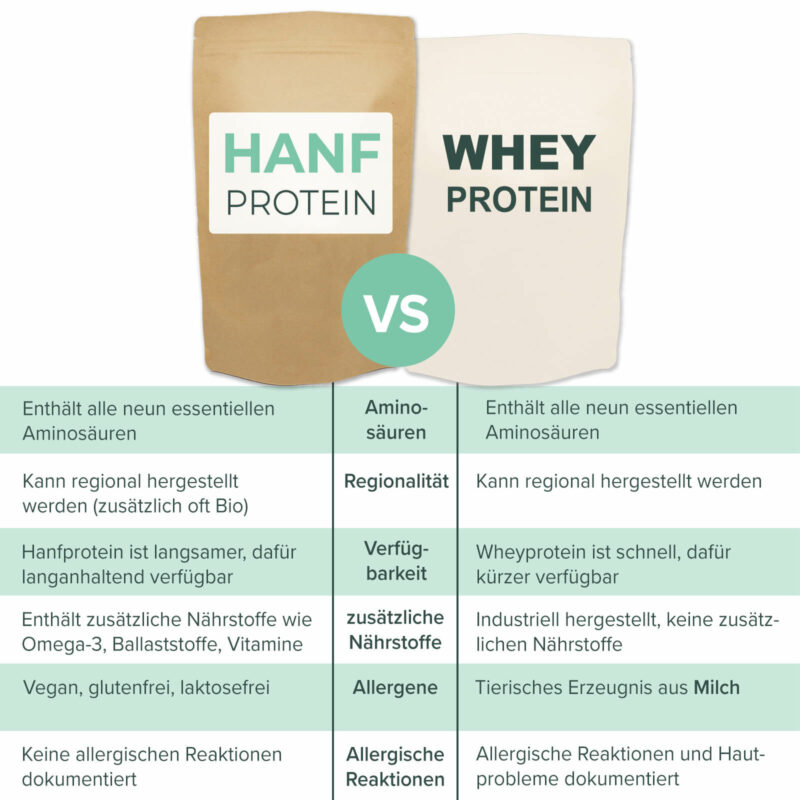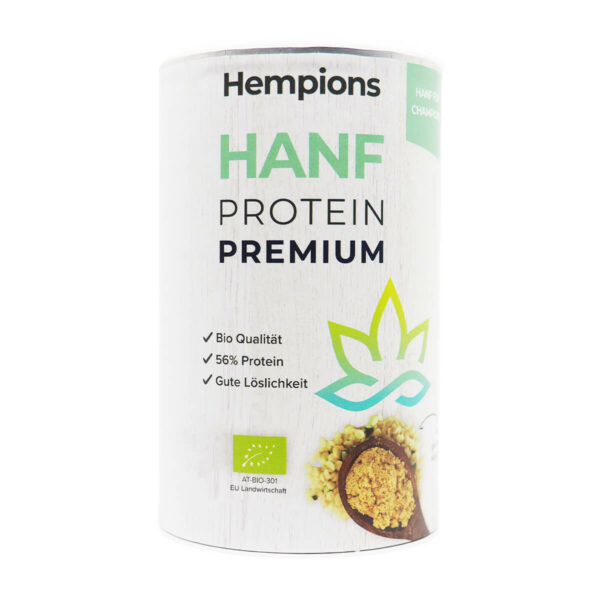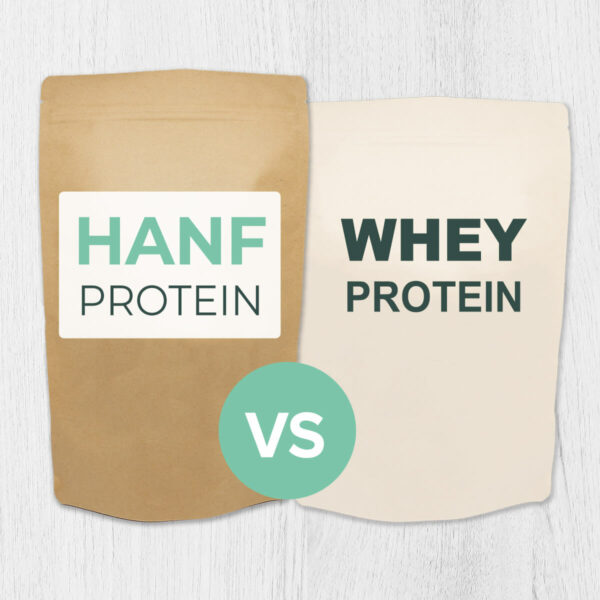You can't wait and want to know right away what the differences are? Click hereto get there directly!
- What does our body need protein for?
- What is Whey Protein?
- What is hemp protein?
- Whey protein vs. hemp protein: differences
- Whey protein vs. hemp protein: Conclusion
The abundance of protein powders on the market seems endless. To help you navigate through this jungle of offers, we compare hemp protein with various plant and animal protein powders in our new series. We collect all the latest findings and make them available to you in a compact form. This time we compare hemp protein vs. whey protein.
What does our body need protein for?
Protein is an essential nutrient for our body. It helps build and repair our bodies. Protein is found in every cell nucleus, tissue and organ. Our bodies need it to produce hormones, enzymes and antibodies. Protein is also an important building block for our bones, skin, hair and nails. The amount of protein needed varies from person to person depending on age, condition and physical activity, among other factors. For example, the protein requirement increases with age because the body can no longer utilise it as well from food.
Protein is found in many foods, but some foods contain more than others. Meat, fish, eggs, legumes, soy, dairy products and nuts are good sources of protein. The best way to get more protein into your body is to get it from your daily diet. However, for some this is not possible or simply not enough. In these cases, protein powder is a good supplement.
But not all protein powders are the same. Depending on their basis and composition, they are accepted and utilised differently by our body. Among other things, they differ in the number and quantity of amino acids they contain.
Amino acids are the building blocks of proteins. Our body needs 20 different amino acids, but can only produce 11 itself. The other nine essential amino acids must be supplied through food. Both hemp protein and whey contain all nine.
What is Whey Protein?
Whey protein is an animal protein obtained from milk. Whey remains as a by-product in the production of cheese. This is processed into whey powder, better known as Whey protein.
Whey protein is a "complete" protein that contains all nine essential amino acids that the body cannot produce itself. The protein in Whey is biologically high quality and therefore easily accessible to the body and can be processed well. It is a so-called "fast" protein, which means that it can be quickly absorbed and utilised by the body.
Whey ranks as one of the most widely used protein powders, but has been meeting some competition in recent years, especially from the world of plant-based protein powders.
What is hemp protein?
Hemp protein is a natural and vegetable protein obtained from the seeds of the hemp plant. Hemp protein is made from hemp, which has no psychoactive effect. On the contrary, hemp is a high-quality source of vitamins, minerals, fibre, omega-3 fatty acids and amino acids.
With around 25 % of vegetable protein, hemp seeds contain a large amount of high-quality protein. Studies show that hemp protein is comparable to protein from eggs and soy. It is digested and utilised slowly and therefore provides the body with nutrients over a longer period of time.
It is great for vegetarians, vegans and anyone who prefers a plant-based diet. In addition, hemp protein is gluten-free and naturally produced.
Whey protein vs. hemp protein: differences
The two protein powders made from whey and hemp differ significantly in these 6 points:

1. recovery speed
Utilisation rate is the speed at which the body absorbs and utilises a nutrient. Whey protein can be digested more quickly, which means that the amino acids it contains are broken down more quickly and can be used directly by the body to build muscle. Hemp protein takes longer to be processed by the body, but provides the body with sustainable nutrition over a longer period of time.
2. compatibility
In terms of tolerability, hemp protein is the clear winner so far.
Whey protein is digested well by people who can tolerate it, but there are also a large number of people who cannot. Especially for people with lactose intolerance or sensitivity, Whey can be a problem and lead to side effects such as skin problems.
Another disadvantage of whey protein is that it is often loaded with antibiotics and hormones. These can lead to side effects such as acne, hair loss and weight gain. No allergic reactions to hemp or its components have been documented so far. It is generally considered to be very well tolerated.
3. essential amino acids
Both protein powders receive all nine essential amino acids that the body cannot produce itself. In terms of the amount of amino acids, Whey protein stands out positively as it is greater than that in hemp protein.
4. regionality
In general, both Whey and hemp can be produced regionally, as milk is available everywhere and hemp can be grown almost worldwide. Especially with Whey protein, however, you should be careful and read the label carefully, as it is not always obvious at first glance where the raw materials come from. Hemp protein has so far been more of a niche product from the organic sector and therefore tends to have already undergone stricter controls with regard to origin.
5. additional benefit
Whey has to be heavily industrially processed to obtain Whey protein, which is why hardly any vitamins and other positive additional nutrients are retained in Whey. Besides amino acids, it consists mostly only of fat and carbohydrates.
Hemp protein, on the other hand, is produced naturally and retains almost all the high-quality nutrients.
It is rich in fibre, which can help lower cholesterol, has a positive effect on blood sugar levels and is good for gut health. Hemp protein is also high in omega-3 fatty acids, which are anti-inflammatory and important for brain function.
Another important ingredient is vitamin E, which is also known as an "anti-aging" vitamin and supports cell renewal.
6. dissemination & acceptance
Whey protein was the pioneer among protein powders and is therefore more readily available and often less expensive.
Hemp protein, on the other hand, has only recently become more popular and, due to this and its gentle production, is somewhat more expensive.
Hemp also continues to struggle with the stigma of being a drug. Although a lot of education is being done in this regard, many athletes are still not aware that commercial hemp, from which hemp protein is extracted, has no intoxicating effect.
However, the acceptance and knowledge around hemp continues to grow. Hemp protein is particularly popular with lactose intolerant, vegans and people who prefer a plant-based diet.
Whey, on the other hand, is not suitable for these groups due to its animal origin and milk-based basis.
Whey protein vs. hemp protein: Conclusion
Many different factors play a role in choosing the right protein powder. In summary, it can be said that there is no right or wrong. The personal goal and the individual attitude are decisive. For vegans and supporters of a plant-based diet as well as people with lactose intolerance, the choice is quickly made. For all others, it can be roughly said - whey protein is the faster, hemp protein the more complete source. If pure protein intake without regard to other beneficial nutrients is crucial and the consumption of animal foods is not a problem, then Whey protein is a good choice. However, if besides pure protein intake, an overall improvement of the body and diet is also targeted, then hemp protein powder is excellent.
Curious now?
At Hempions we have two different hemp proteins in our range.
Hemp Protein High Fiber from unhulled hemp seeds and Hemp Protein Premium from hulled hemp seeds.
Hemp Protein High Fiber has a higher fibre content due to the additional processing of the shell. Hemp Protein Premium has a higher value of omega-3 fatty acids, minerals and vitamins.
More information about hemp protein and the most important differences between the two variants can be found in in this article.
-
 Organic Hemp Protein High FiberProduct on salefrom € 4,99
Organic Hemp Protein High FiberProduct on salefrom € 4,99incl. VAT
plus shipping costs
Delivery time: 2-4 workdays
-
 Organic Hemp Protein PremiumProduct on salefrom € 7,99
Organic Hemp Protein PremiumProduct on salefrom € 7,99incl. VAT
plus shipping costs
Delivery time: 2-4 workdays
Free recipe book
If you're wondering what you can make with hemp protein powder, we've got you covered.
here's the right thing for you - our hemp recipe book with over 50 hemp-related recipes!
Download it now for free:


